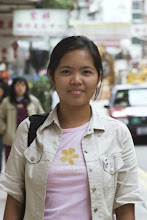I myself have seen the aftermath of Ondoy. Yesterday, I walked along with others in Marcos Highway (After Marikina bridge) to Imelda Avenue so that I could reach in time Kim Rogado and her Lolo in Karangalan Village, Cainta. Luck struck me several times:
1. I forgot to bring my umbrella, it did not rain;
2. I couldn't withdraw money from ATM, my less than a hundred pesos in my pocket got me far enough;
3. When I reached the village gate, I caught the rescue rubber boat just in time, apparently the last trip before it malfunctioned;
4. Kim and her Lolo were safely rescued thanks to kapitbahays for the shelter;
5. On our walk along Marcos Highway in front of Sta Lucia mall, we have chanced up at a canteen where we had our breakfast (rice an porkchop!) -- no long lines of people!
Miracles happen in so many ways. I thank the Filipino people for extending their helping hands in this time of adversity. We enjoin others to do the same.
I also thank KKK members who helped in cleaning up the ASPBAE office in Anonas. The organization is here to extend support especially to members residing in Marikina and Cainta.
Thanks Kim for sharing your typhoon story in your blogspot. Stay safe everyone.


